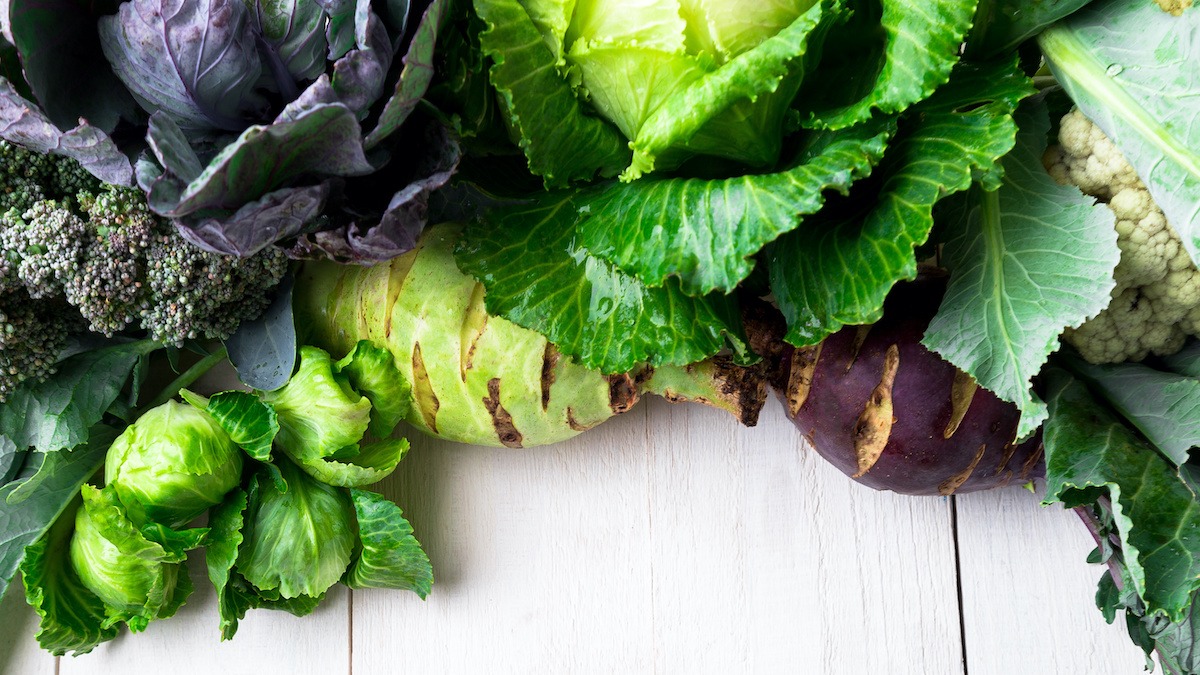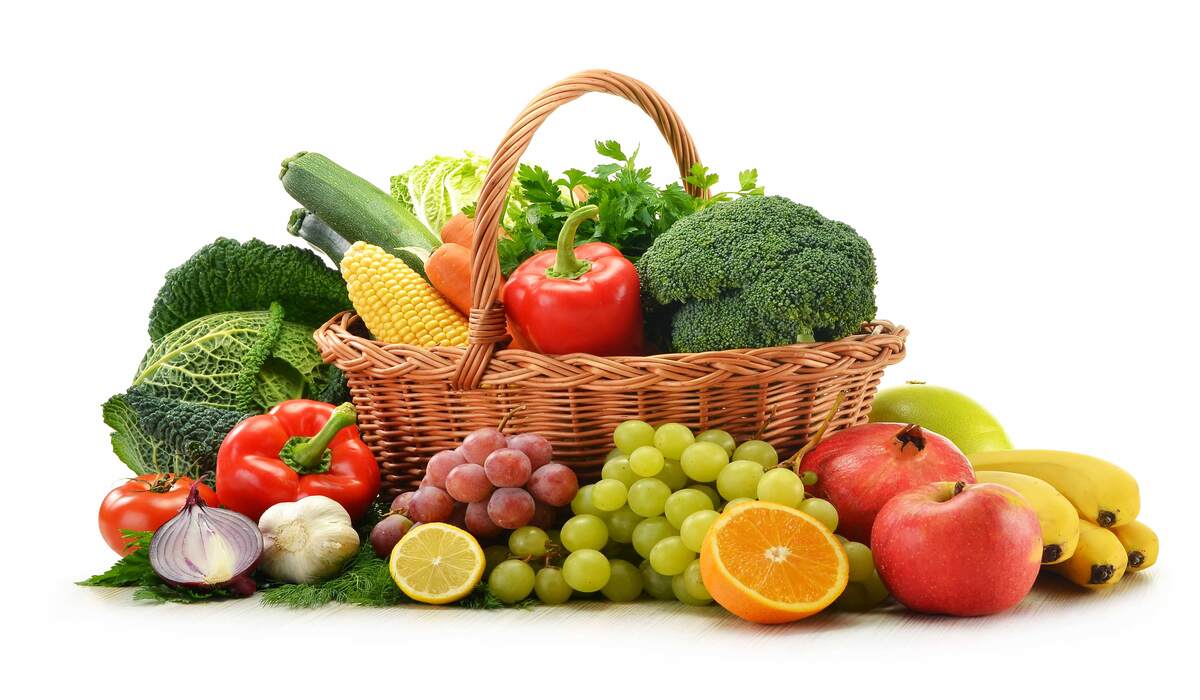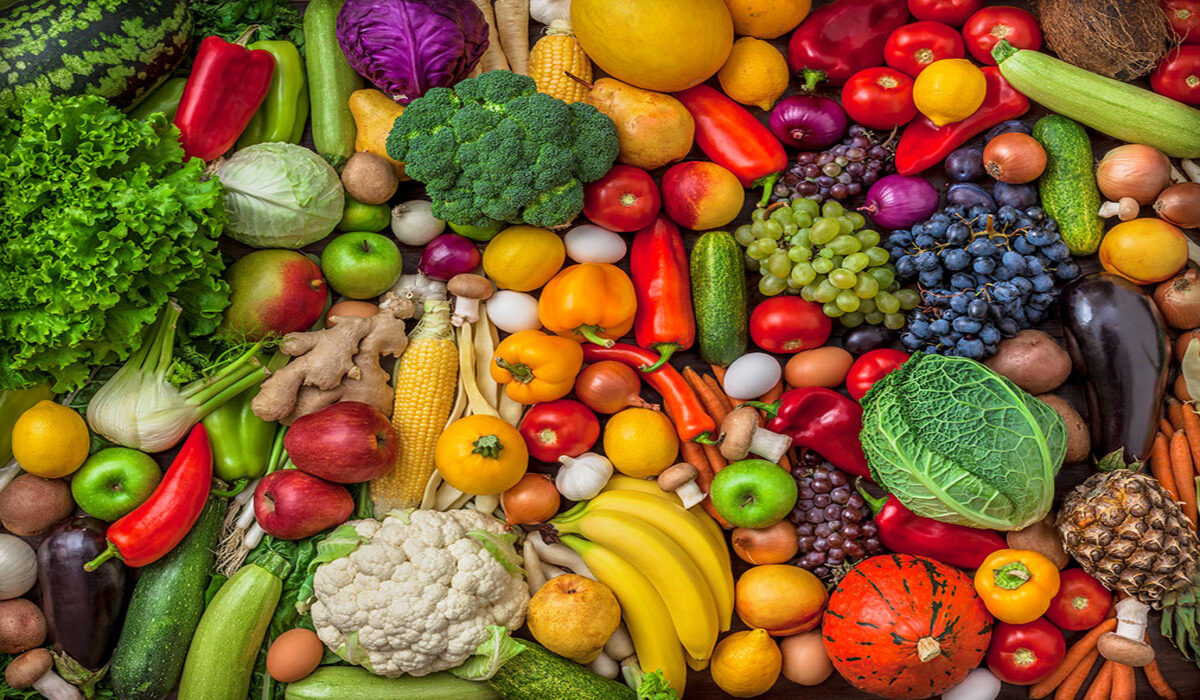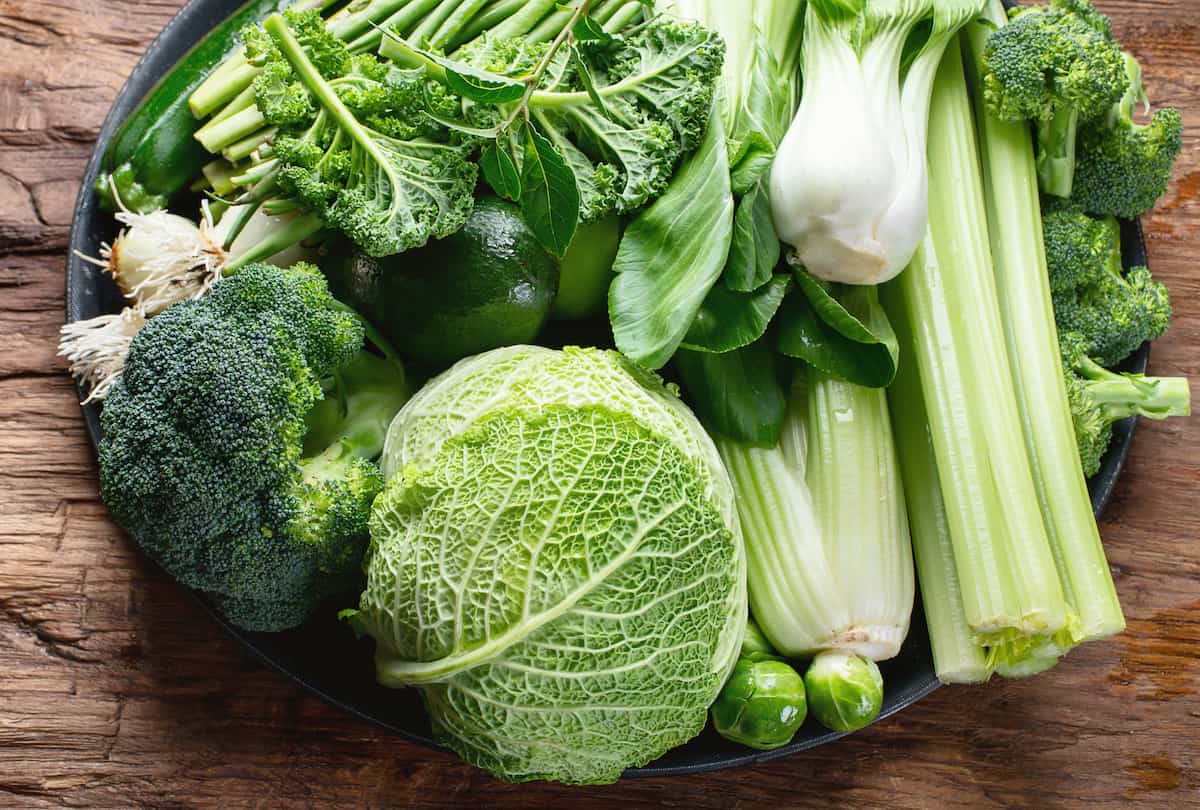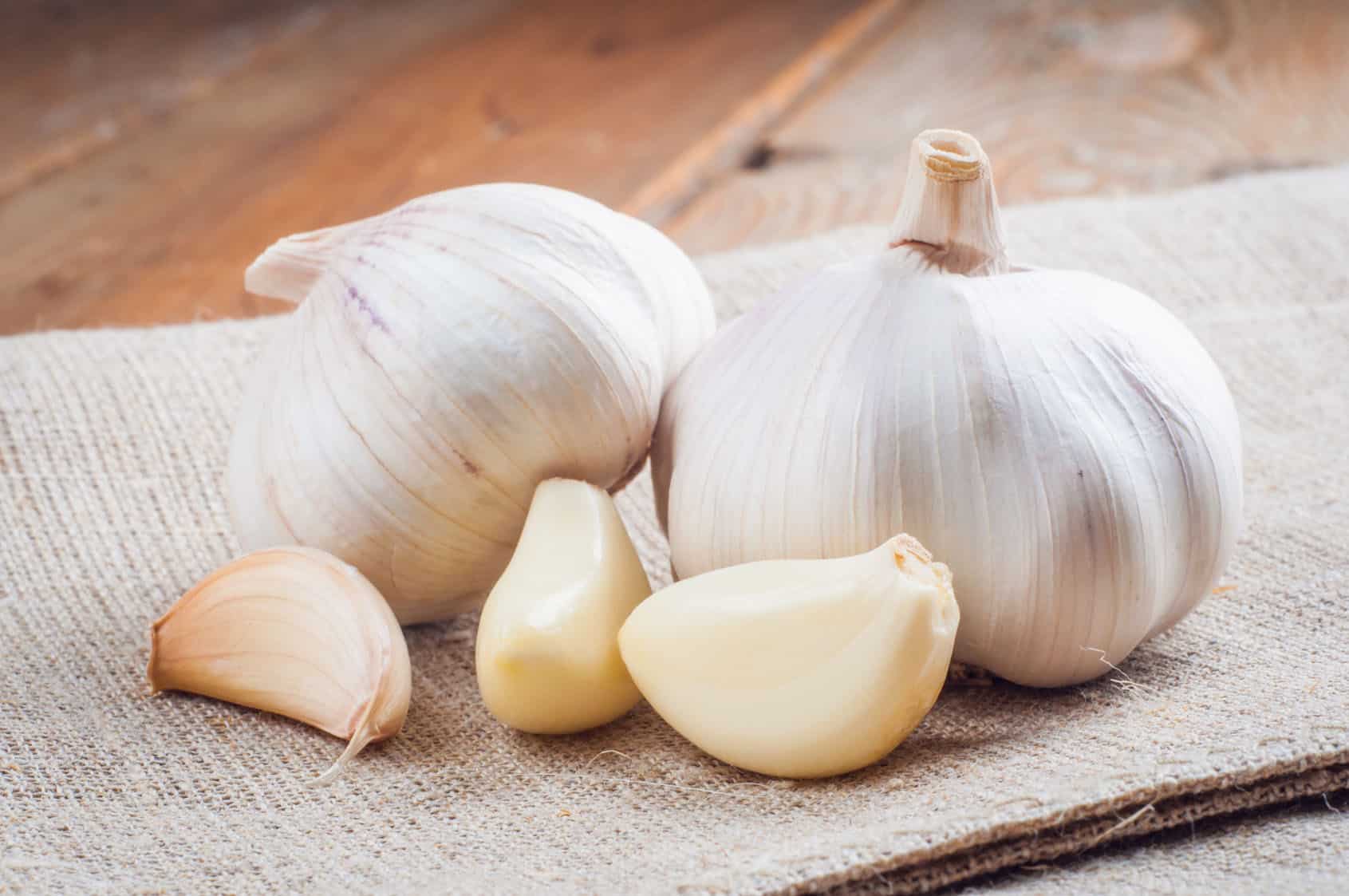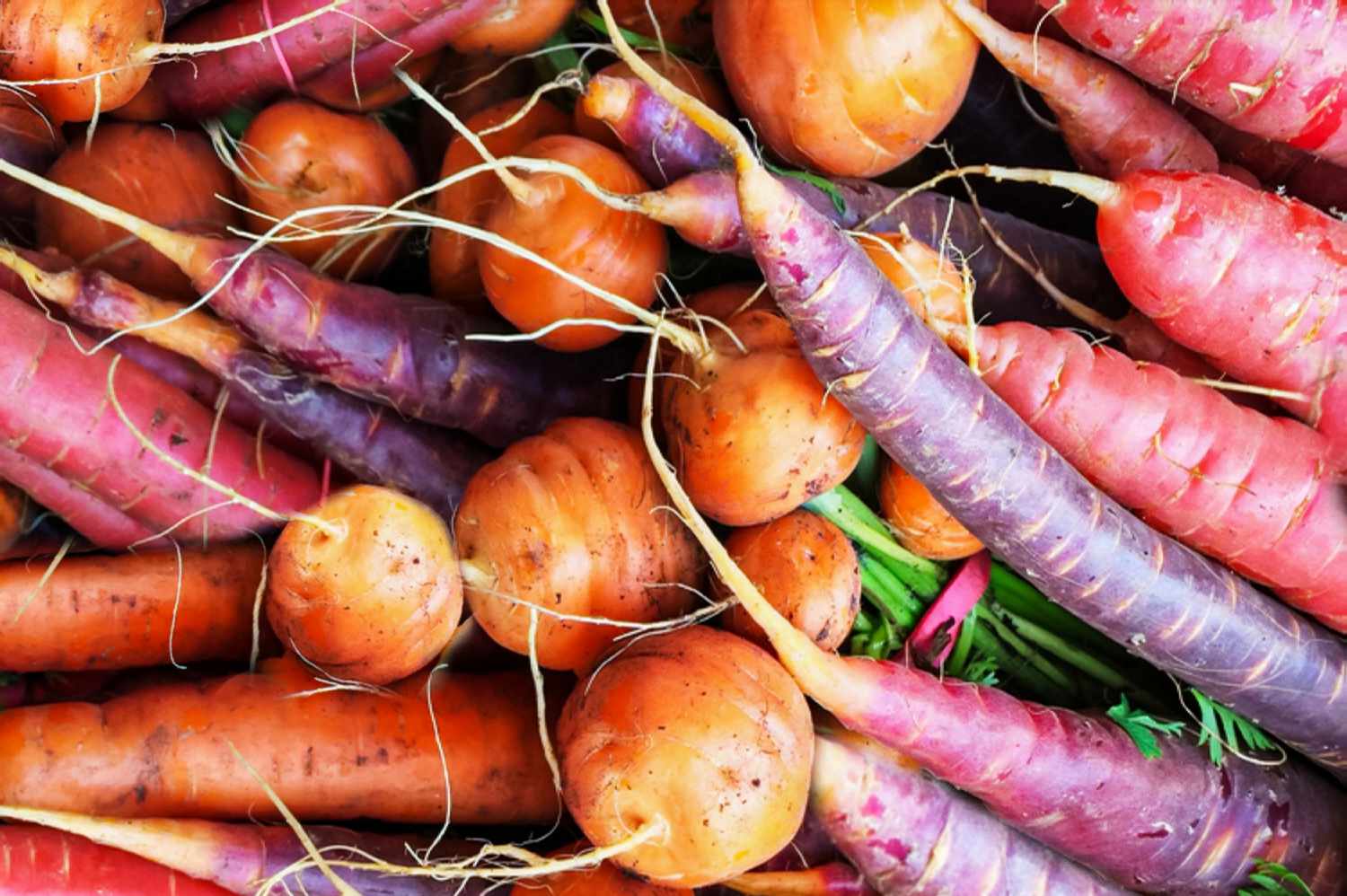Home>Types of Gardening>Edible Gardening>What Is Organic Vegetables
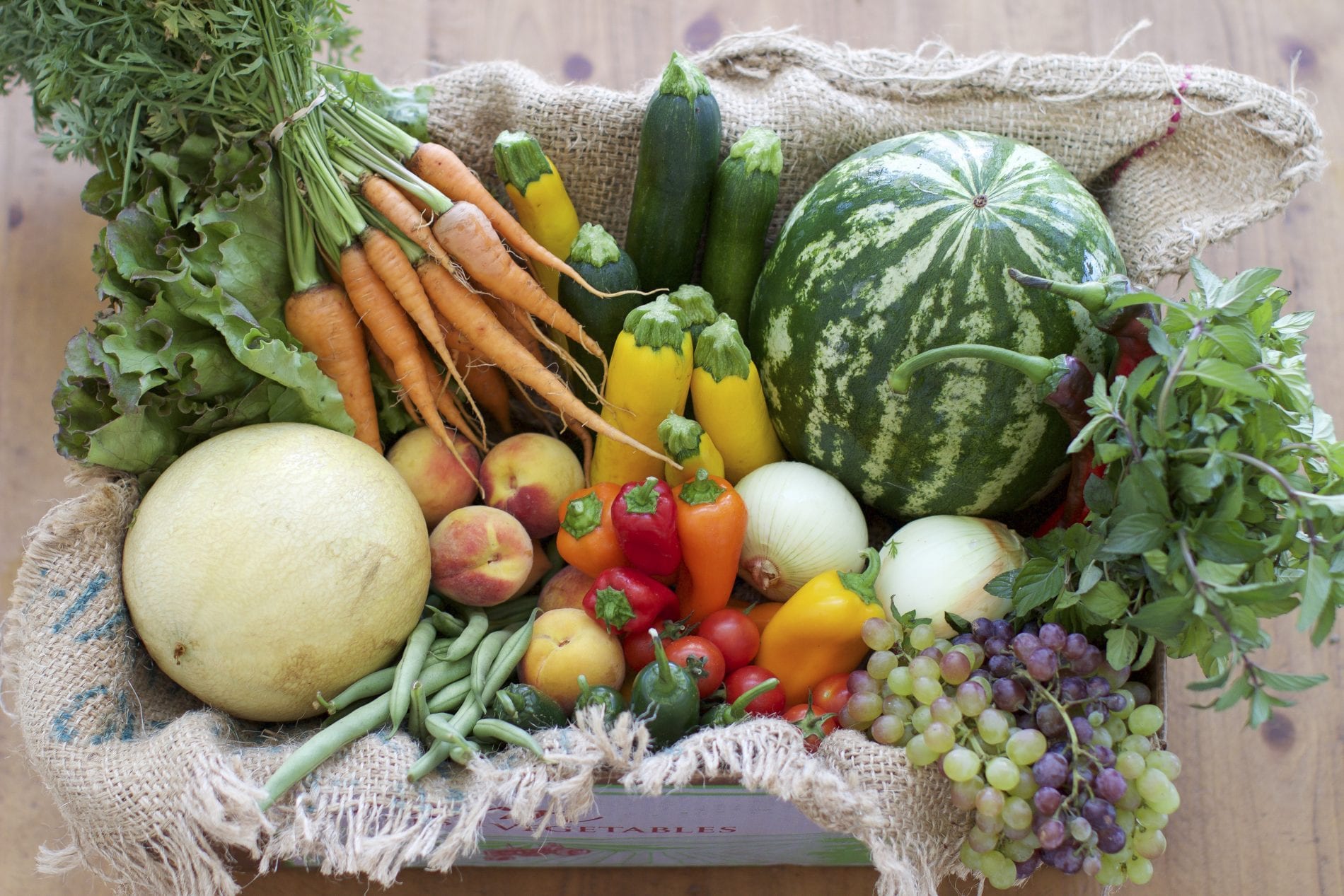

Edible Gardening
What Is Organic Vegetables
Modified: January 22, 2024
Discover the benefits of growing organic vegetables in your own edible garden. Learn how to cultivate nutrient-rich, chemical-free produce and enjoy a healthier, sustainable lifestyle.
(Many of the links in this article redirect to a specific reviewed product. Your purchase of these products through affiliate links helps to generate commission for Chicagolandgardening.com, at no extra cost. Learn more)
Table of Contents
- Introduction
- Definition of Organic Vegetables
- Benefits of Organic Vegetables
- Organic Farming Practices
- How to Identify Organic Vegetables
- Organic Certification and Labeling
- Nutritional Value of Organic Vegetables
- Environmental Impact of Organic Vegetable Production
- Common Myths and Misconceptions about Organic Vegetables
- Conclusion
Introduction
Welcome to the world of organic gardening, where you can cultivate your own delicious and nutritious vegetables right in your backyard. In recent years, there has been a growing interest in organic gardening and a heightened awareness of the benefits it offers. Whether you are a seasoned gardener or just starting out, understanding the principles and practices of organic vegetable gardening will empower you to grow your own fresh produce while promoting a healthier environment.
Organic vegetables refer to crops that are grown without the use of synthetic fertilizers, pesticides, genetically modified organisms (GMOs), or any other artificial chemicals. Instead, organic gardening focuses on using natural methods and resources, such as compost, crop rotation, and beneficial insects, to nurture the plants and maintain soil fertility.
The benefits of organic vegetables are numerous. Not only are they free from harmful chemicals, but they also tend to be more flavorful and nutrient-rich. Organic farming practices prioritize soil health and biodiversity, resulting in higher levels of essential vitamins, minerals, and antioxidants in the produce.
By avoiding the use of synthetic chemicals, organic gardening helps protect the environment and promotes biodiversity. It reduces water pollution, conserves energy, and preserves the health of beneficial insects, birds, and other wildlife that play a crucial role in maintaining ecological balance.
In this article, we will delve into the world of organic vegetable gardening, exploring the benefits, practices, and nutritional value of organically grown produce. We will also address common myths and misconceptions surrounding organic vegetables, providing you with a comprehensive understanding of this sustainable and rewarding gardening approach.
Definition of Organic Vegetables
Organic vegetables are crops that are grown using natural methods and without the use of synthetic fertilizers, pesticides, genetically modified organisms (GMOs), or any other artificial chemicals. Instead, organic farming relies on sustainable practices that prioritize soil health, biodiversity, and ecological balance.
To be certified as organic, vegetables must meet specific standards set by organic certification bodies. These standards vary by country, but they commonly require farmers to use organic seeds, avoid synthetic chemicals, and follow strict guidelines for soil management, pest and weed control, and crop rotation.
Organic farming practices focus on fostering a healthy, nutrient-rich soil ecosystem. This is achieved through the use of organic matter, such as compost and cover crops, which improves soil structure, retains moisture, and provides essential nutrients to plants. The goal is to create a self-sustaining system where plants receive the necessary nutrients from the soil, rather than relying on external inputs.
Pest and weed control in organic vegetable farming is achieved through natural methods. Beneficial insects, such as ladybugs and lacewings, are encouraged to control pest populations, while physical barriers, like row covers, can protect crops from insects and pests. Weeds are managed through hand weeding, mulching, and crop rotation, minimizing the need for herbicides.
Organic farming also emphasizes the importance of biodiversity. By promoting diverse plant species, organic farmers help create habitats for beneficial insects and birds, which play a crucial role in pollination and natural pest control. Crop rotation is another important practice in organic agriculture, where different crops are rotated to prevent soil depletion, control pests, and promote nutrient balance.
It is important to note that while organic farming strives to minimize the use of chemicals, it does not mean that no substances are used. Approved organic inputs, such as certain naturally-derived pesticides and fertilizers, can still be used when necessary, but their use is strictly regulated and monitored.
Overall, organic vegetables are grown with a holistic approach that prioritizes the health of both the consumer and the environment. By choosing organic produce, you can be assured that you are supporting sustainable agricultural practices that promote biodiversity, protect natural resources, and provide you with nutritious and delicious vegetables.
Benefits of Organic Vegetables
Organic vegetables offer a myriad of benefits, making them a popular choice for health-conscious individuals and environmentally conscious consumers. Let’s explore some of the key advantages of choosing organic produce:
- Nutritional Value: Organic vegetables are known to be more nutrient-rich compared to their conventionally grown counterparts. Studies have shown that organic crops contain higher levels of essential vitamins, minerals, and antioxidants, such as vitamin C, iron, and polyphenols. These nutrients are vital for the overall health and well-being of our bodies.
- Free from Harmful Chemicals: One of the main reasons people opt for organic vegetables is to avoid exposure to synthetic pesticides and fertilizers. Conventionally grown crops often contain residual traces of these chemicals, which can pose health risks when consumed. Organic farming eliminates the use of these harmful substances, providing consumers with peace of mind and reducing potential health hazards.
- Enhanced Flavor: Many organic vegetable enthusiasts rave about the superior taste and flavor of organically grown produce. The absence of synthetic chemicals allows the natural flavors of the vegetables to shine through, providing a delightful and memorable culinary experience.
- Safe for the Environment: Organic agriculture practices are designed to protect and preserve the environment. By avoiding the use of synthetic chemicals, organic farming minimizes air and water pollution, reduces soil erosion, and promotes the health of beneficial insects, birds, and other wildlife. Organic farmers also focus on soil conservation, water management, and biodiversity, contributing to the sustainability of our ecosystems.
- Supports Local Communities: Choosing organic vegetables often means supporting local farmers who practice sustainable agriculture. Buying local organic produce helps strengthen local economies, promotes food security, and fosters a closer connection between consumers and producers.
- Health Benefits: Consuming organic vegetables can have positive effects on our health. The absence of synthetic chemicals reduces the risk of pesticide exposure and potential associated health issues. Additionally, organic vegetables are free from genetically modified organisms (GMOs), which may have long-term health implications that are still under study.
With these numerous benefits, it’s clear why organic vegetables are becoming increasingly popular. By incorporating organic produce into your diet, you not only make a positive impact on your own health but also contribute to a more sustainable and environmentally friendly food system.
Organic Farming Practices
Organic farming practices encompass a range of techniques and principles aimed at cultivating crops in a sustainable and environmentally friendly manner. While specific methods may vary depending on the farm and location, there are common practices followed by organic farmers worldwide:
- Soil Management: Organic farmers prioritize soil health as the foundation of their agricultural practices. They focus on building and maintaining fertile soil through the use of compost, cover crops, and organic matter. These techniques improve soil structure, retain moisture, and provide essential nutrients to plants, resulting in healthier crops and reduced reliance on external inputs.
- Composting: Composting is a key component of organic farming. It involves the decomposition of organic waste, such as food scraps, yard trimmings, and animal manure, to create nutrient-rich compost. This compost is then added to the soil to enrich its fertility and enhance its ability to retain moisture.
- Pest and Weed Management: Organic farmers employ various methods to control pests and manage weeds without the use of synthetic chemicals. They utilize organic and natural pesticides derived from plant extracts, beneficial insects, and physical barriers to prevent pest damage. Weeds are managed through techniques like hand weeding, mulching, and crop rotation, which help suppress weed growth and maintain a healthy balance within the ecosystem.
- Crop Rotation: Crop rotation is a practice in which different crops are planted in a specific sequence over several growing seasons. This helps to minimize soil erosion, control pests and diseases, and maintain nutrient balance in the soil. By rotating crops, organic farmers can break the life cycles of pests and weeds, reduce the need for chemical interventions, and promote soil health.
- Water Management: Organic farming advocates for efficient water management, employing techniques like drip irrigation and mulching to conserve water. Proper soil management practices also contribute to water conservation, as healthy soil retains moisture more effectively. Additionally, organic farmers aim to improve the water-holding capacity of their soils through organic matter enrichment.
- Biodiversity Conservation: Organic farmers encourage biodiversity on their farms by planting a variety of crops, incorporating hedgerows and windbreaks, and providing habitats for beneficial insects, birds, and wildlife. This helps to maintain a natural balance within the ecosystem, promotes pollination, and reduces the risk of pest outbreaks.
These organic farming practices, combined with strict adherence to organic standards and certification requirements, enable farmers to produce crops that are free from synthetic chemicals, environmentally sustainable, and nutritious. By adopting these practices, organic farmers play a vital role in promoting a healthier planet and ensuring the long-term viability of our food systems.
How to Identify Organic Vegetables
Identifying organic vegetables can be a bit challenging, especially when there isn’t clear labeling or direct interaction with the farmer. However, here are some tips to help you identify organic vegetables:
- Look for Organic Certification Labels: One of the easiest ways to identify organic vegetables is by looking for organic certification labels. In many countries, organic produce undergoes a certification process and is labeled accordingly. Look for labels such as USDA Organic, EU Organic, or other certification logos specific to your region.
- Check for PLU Codes: The Price Look-Up (PLU) code on produce stickers can provide some information about the farming practices used. A five-digit code starting with a 9 indicates that the item is organic, while a code starting with a 4 or 3 indicates conventionally grown produce.
- Visit Local Farmers’ Markets: Shopping at farmers’ markets provides an opportunity to connect directly with local farmers and ask them about their farming practices. Many organic farmers sell their produce at farmers’ markets, and they are often eager to share information about their organic growing methods.
- Know Your Grower: If you have access to community-supported agriculture (CSA) programs or local co-ops, you can get to know your growers and their farming practices. In these direct-to-consumer models, you can gain a deeper understanding of the farming methods used and the commitment to organic practices.
- Shop at Organic-Specific Stores: Stores that specialize in organic products usually have a clear selection of organic vegetables. These stores go through a verification process to ensure that the products they sell meet the necessary organic standards.
- Look for Signs of Natural Pest and Weed Management: While it may not guarantee organic status, signs of natural pest and weed management practices can indicate that the vegetables were grown using organic methods. For example, evidence of beneficial insects or companion planting to deter pests may suggest organic cultivation.
It is important to remember that not all organic farms are certified or use certification labels due to the associated costs and paperwork. Additionally, local and small-scale farmers who follow organic practices may not have certification but can still offer organic-quality vegetables. Building a relationship with your local farmers and understanding their farming practices can give you confidence in the organic nature of their produce.
By becoming familiar with these methods to identify organic vegetables, you can make more informed choices that align with your preferences for organic produce. Supporting organic farming practices not only benefits your health but also contributes to a more sustainable and environmentally friendly food system.
Organic Certification and Labeling
Organic certification and labeling play a crucial role in ensuring transparency and trust in the organic food industry. Certification provides a standardized process to verify that organic farms and products meet specific organic standards set by regulatory bodies. Let’s explore the certification process and labeling requirements for organic vegetables:
Certification Process: Organic certification involves a thorough evaluation of farming practices, record-keeping, and compliance with organic standards. The process typically includes the following steps:
- Application: Farmers or producers must complete an application and submit it to an accredited organic certification agency or body. The application includes details about the farm’s history, land use, production methods, and any substances used.
- Inspection: An inspector visits the farm to assess compliance with organic standards. They review records, observe farming practices, and ensure that the farm meets the requirements for soil health, pest management, crop rotation, and animal welfare (if applicable).
- Record-keeping: Organic farmers must maintain detailed records of their farming practices, including inputs used, crop rotation schedules, and any pest and weed management activities. These records are crucial for inspection and certification renewal.
- Review and Certification: The certification agency reviews the inspection report and farm records to determine if the farm meets the organic standards. If the farm meets the requirements, it is granted organic certification for a specific period.
- Annual Renewal: Organic certification is not a one-time process. Farmers must undergo regular inspections and renew their certification annually to ensure continued compliance with organic standards.
Labeling Requirements: Once a farm or product is certified organic, specific labeling requirements must be followed. These labeling requirements may vary between countries, but typically include the following:
- Organic Certification Seal: Certified organic products usually bear an organic certification seal or logo on the packaging. These seals indicate that the product meets the organic standards set by the certifying body. Examples include the USDA Organic seal in the United States or the EU Organic logo in European Union countries.
- Organic Claims: The label may include wording such as “Certified Organic,” “Organic,” or “100% Organic” to clearly convey that the product has met organic certification standards. The use of the term “organic” is regulated and requires adherence to specific criteria.
- List of Ingredients: The label should include a list of ingredients, with organic ingredients identified as such. This allows consumers to understand the composition of the product and make informed choices based on their preferences.
- Organic Percentage: In some cases, the label may indicate the percentage of organic ingredients in the product. For instance, if a product contains 95% organic ingredients, it may be labeled as “95% Organic.”
- Certification Agency: The label may include the name or logo of the certification agency responsible for inspecting and certifying the farm or product. This provides additional transparency and allows consumers to research the certifying body if desired.
It is important to note that while organic certification provides an assurance of organic practices, not all organic farmers undergo the certification process. Some small-scale or local farmers may follow organic practices but choose not to pursue certification due to the associated costs. Building a relationship with these farmers and understanding their farming practices can help ensure the integrity of their organic produce.
By understanding the organic certification and labeling requirements, consumers can make informed choices and support the organic food industry. Organic certification and labeling provide transparency, foster consumer confidence, and promote the growth of sustainable and environmentally friendly agricultural practices.
Nutritional Value of Organic Vegetables
Organic vegetables are renowned for their superior nutritional value compared to conventionally grown vegetables. The organic farming practices and absence of synthetic chemicals result in several key factors that contribute to the increased nutritional content of organic vegetables:
- Higher Levels of Antioxidants: Organic vegetables tend to contain higher levels of antioxidants, such as vitamin C, vitamin E, and various phenolic compounds. Antioxidants play a crucial role in protecting our bodies against cellular damage caused by harmful free radicals.
- Essential Nutrient Content: Organic vegetables often contain higher levels of essential nutrients, including vitamins, minerals, and trace elements. Studies have shown that organic crops can contain higher levels of nutrients such as vitamin C, iron, magnesium, and zinc, which are vital for maintaining good health.
- Healthy Fats in Leafy Greens: Leafy greens, such as spinach and kale, are excellent sources of healthy fats. Organic farming practices have been found to promote the production of beneficial omega-3 fatty acids in these greens, enhancing their nutritional value.
- Lower Nitrate Levels: Organic vegetables typically have lower nitrate levels compared to conventionally grown vegetables. Excessive nitrate consumption can pose health risks. Organic farming practices, such as limited use of nitrogen-based fertilizers, help reduce nitrate accumulation in vegetables.
- No Genetic Modification: Organic vegetables are grown without the use of genetically modified organisms (GMOs). While the long-term health effects of GMOs are still a topic of debate, many people choose organic vegetables to avoid potential risks associated with genetically modified crops.
- Absence of Synthetic Chemical Residues: Organic vegetables are grown without synthetic pesticides, herbicides, and fertilizers. This significantly reduces the chances of ingesting residual chemicals that may be present on conventionally grown produce. Consuming organic vegetables ensures a lower chemical load in your diet.
It is worth noting that while organic vegetables have these potential nutritional benefits, the overall nutritional value of any vegetable can vary depending on factors such as soil quality, ripeness at harvest, and storage conditions. Therefore, it is important to remember that the organic label doesn’t guarantee optimal nutrition but does indicate a commitment to sustainable and environmentally friendly farming practices.
By incorporating organic vegetables into your diet, you can enjoy the potential health benefits of increased antioxidant levels, essential nutrients, and a reduced intake of synthetic chemicals. However, the most important aspect of any balanced diet is the consumption of a wide variety of fruits and vegetables, regardless of their organic status. Aim to include a colorful assortment of vegetables to ensure a diverse nutrient intake and support overall health and well-being.
Environmental Impact of Organic Vegetable Production
Organic vegetable production has a significantly lower environmental impact compared to conventional farming methods. Organic farming practices prioritize sustainability, biodiversity, and the responsible use of natural resources. Let’s explore some of the key environmental benefits of organic vegetable production:
- Reduced Chemical Pollution: Organic farming avoids the use of synthetic pesticides, herbicides, and fertilizers. This significantly reduces chemical pollution of soil, water, and air. By minimizing chemical inputs, organic vegetable production helps preserve water quality, protect beneficial insects and wildlife, and supports a healthier ecosystem.
- Enhanced Soil Health: Organic farming practices focus on improving soil health and fertility through the use of natural methods. By incorporating organic matter, using cover crops, and avoiding synthetic chemicals, organic farmers promote microbial activity, enhance soil structure, and increase organic carbon content. Healthy soils not only support crop growth but also contribute to carbon sequestration, helping mitigate climate change.
- Water Conservation: Organic farming practices emphasize efficient water management. Techniques such as drip irrigation, mulching, and soil conservation practices improve water retention in the soil, reducing water runoff and conserving this precious resource. By minimizing water usage, organic vegetable production helps alleviate strain on local water supplies.
- Promotion of Biodiversity: Organic farms tend to have higher levels of biodiversity compared to conventional farms. Organic farming practices, such as planting diverse crops, creating wildlife habitats, and avoiding synthetic chemicals, support the presence of beneficial insects, pollinators, and birds. This biodiversity helps maintain ecological balance, improves natural pest control, and increases overall ecosystem resilience.
- Lower Energy Consumption: Organic vegetable production generally requires lower energy inputs compared to conventional farming methods. Instead of relying on synthetic fertilizers and pesticides, organic farmers use natural methods and resources that require less energy for production and application. This reduces greenhouse gas emissions associated with energy consumption and contributes to a more sustainable agricultural system.
- Preservation of Genetic Diversity: Organic farms often prioritize the preservation of heirloom and traditional crop varieties. This helps conserve genetic diversity and prevent the loss of unique plant genetic resources. Preserving diverse crop varieties is vital for resilience against pests, diseases, and changing environmental conditions.
By choosing organic vegetables, consumers can actively support environmentally friendly farming practices and contribute to the protection of natural resources. Organic farming systems prioritize sustainability, soil health, biodiversity, and reduced chemical pollution, making them a more sustainable choice for cultivating and consuming vegetables.
However, it is important to note that organic farming, like any agricultural system, is not without environmental challenges. Factors such as land use, transportation, and packaging can still have environmental implications. To minimize these impacts, it is beneficial to support local and seasonal organic produce, reduce food waste, and choose eco-friendly packaging options.
Common Myths and Misconceptions about Organic Vegetables
Organic vegetables have gained significant popularity in recent years, but along with their rise in popularity, there are also some common myths and misconceptions surrounding them. Let’s debunk some of these misconceptions and shed light on the truth about organic vegetables:
- Organic Vegetables Are More Nutritious: While organic vegetables have been found to have higher levels of certain nutrients and antioxidants, the overall nutritional content can vary depending on factors such as growing conditions, crop variety, and maturity at harvest. The main benefit of choosing organic vegetables lies in the avoidance of synthetic pesticides and genetically modified organisms (GMOs), rather than a significant increase in nutrient content.
- Organic Vegetables Are Completely Pesticide-Free: Organic farming does allow the use of certain approved natural pesticides. However, these pesticides are derived from natural sources and are strictly regulated to ensure they do not pose harm to human health or the environment. Organic farmers prioritize the use of natural pest management techniques and only turn to approved pesticides as a last resort.
- Organic Vegetables Have No GMOs: Organic farming strictly prohibits the use of genetically modified organisms (GMOs) in the production process. Organic vegetables are grown from organic seeds that have not been genetically modified. However, it is important to note that there is a risk of cross-contamination from neighboring fields, especially in areas where GMO crops are widely grown.
- Organic Vegetables Have Perfect Appearance: Organic vegetables may not always have the same flawless appearance as conventionally grown produce. The absence of synthetic chemicals means that organic vegetables may have natural variations in size, shape, and color, as well as occasional blemishes. However, these variations do not affect the nutritional value or taste of the vegetables.
- Organic Vegetables Are More Expensive: It is true that organic vegetables can be more expensive than conventionally grown vegetables. Organic farming requires more labor-intensive practices, and the costs associated with organic certification can contribute to the higher price. However, factors such as seasonality, local sourcing, and buying directly from farmers can help make organic vegetables more affordable.
- Organic Agriculture Can’t Feed the World: One common misconception is that organic agriculture is not capable of feeding the growing global population. However, numerous studies have shown that organic farming practices, combined with improved soil management, crop rotation, and agroecological approaches, can be just as productive as conventional methods. Organic farming has the potential to provide sustainable and nutritious food for a growing population while minimizing environmental impacts.
It is important to base our understanding of organic vegetables on accurate information and scientific research. Organic farming offers numerous benefits, including reduced chemical exposure, improved soil health, and a healthier environment. While it is essential to be informed consumers, it is equally important to approach organic vegetables with an open mind and realistic expectations.
By debunking these common myths and misconceptions, we can better appreciate the value of organic vegetables and make informed choices that align with our health, sustainability, and environmental priorities.
Conclusion
Organic vegetables offer a multitude of benefits for both consumers and the environment. By choosing organic produce, we support sustainable farming practices that prioritize soil health, biodiversity, and the avoidance of synthetic pesticides, herbicides, and genetically modified organisms (GMOs). Organic vegetables are not only free from harmful chemicals but also tend to be more flavorful and nutrient-rich, making them a healthy and delicious addition to our diets.
Organic farming practices provide numerous environmental advantages, such as reduced chemical pollution, enhanced soil health, water conservation, and the promotion of biodiversity. By supporting organic agriculture, we contribute to a more sustainable and ecologically balanced food system, ensuring the long-term health of our planet.
It is important to be aware of common myths and misconceptions surrounding organic vegetables. While they may not always be more nutritious or flawless in appearance, choosing organic vegetables supports responsible and transparent farming practices that prioritize human health and environmental sustainability.
When it comes to identifying organic vegetables, certifications and labels play a significant role. Looking for organic certification labels, checking PLU codes, shopping at organic-specific stores, and building relationships with local farmers can help us make informed choices and support organic farming practices.
In conclusion, embracing organic vegetables is more than just a dietary choice; it is an opportunity to make a positive impact on our health, the environment, and the future of our food systems. By incorporating organic vegetables into our diets, supporting local farmers, and advocating for sustainable practices, we can contribute to a healthier and more sustainable world for generations to come.



